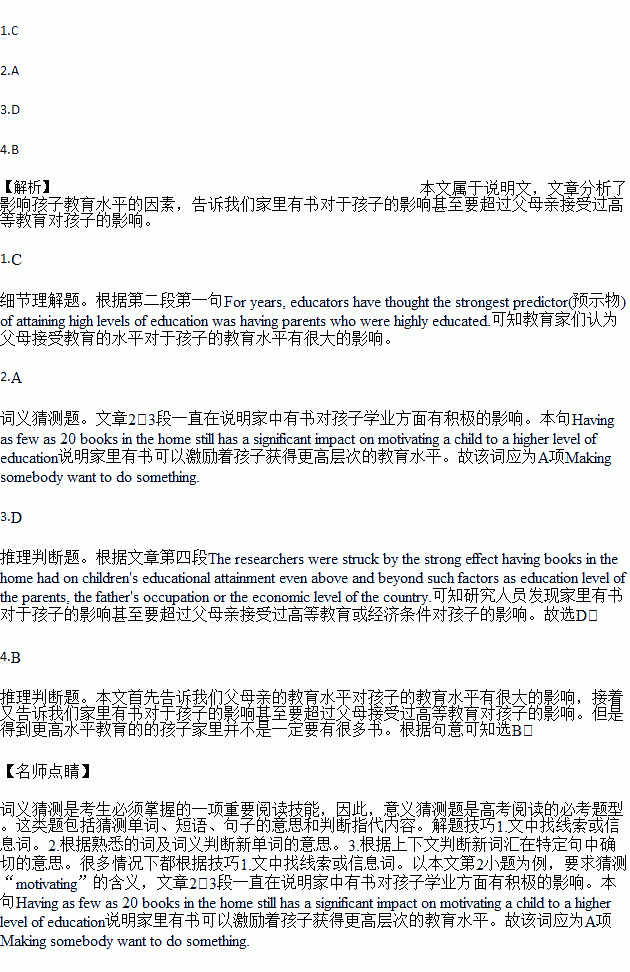题目内容
Whether rich or poor, parents who have books in the home increase the level of education their children will attain, according to a 20-year study led by Mariah Evans.
For years, educators have thought the strongest predictor(预示物) of attaining high levels of education was having parents who were highly educated. But, the study showed that the difference between being raised in a bookless home compared to being raised in a home with a 500-book library has as great an effect on the level of education a child will attain as the difference between having parents who are barely literate (有文化的) and having parents who have a university education.
Being a sociologist, Evans was particularly interested to find that children of lesser-educated parents benefit the most from having books in the home. What kinds of investments should we make to help these kids get ahead? The results of this study indicate that getting some books into their homes is an inexpensive way that we can help these children succeed. Evans said, "Even a little bit goes a long way. Having as few as 20 books in the home still has a significant impact on motivating a child to a higher level of education, and the more books you add, the greater benefit the children get.”
The researchers were struck by the strong effect having books in the home had on children's educational attainment even above and beyond such factors as education level of the parents, the father's occupation or the economic level of the country.
Having books in the home is twice as important as the father's education level, and more important than whether a child was brought up in a developing country or a developed country. Surprisingly, the difference in educational attainment for children born in developed country and children born in developing country was just 2 years, less than two-thirds of the effect that having 500 or more books in the home had on children.
1.In the past educators held a point of view that ______ .
A. children whose family had a library would possibly attain high levels of education
B. children who were born in poor families studied harder than those in rich families
C. children whose parents are highly educated would attain high levels of education
D. parents’ level of education had nothing to do with their children’s levels of education
2.What does the underlined word “motivating” in Paragraph 3 mean?
A. Making somebody want to do something.
B. Helping somebody to finish something
C. Making somebody pretend to do something.
D. Preventing somebody from achieving something.
3.Which of the following has the most important effect on the level of education a child will gain?
A. The economic level of the country.
B. The father’s occupation.
C. Education levels of parents.
D. Having books in the home.
4.Which is the following is NOT TRUE?
A. Getting books into homes is good investment parents can make.
B. Children who get a higher level of education must have many books in their homes.
C. Reading books is good for the development of children.
D. Books in home have a great effect on children’s education levels.


 lity and realizing that________are only stepping-stones to final success. After many attempts, many failures, many lessons and many false starts, learn valuable lessons from failure, tum dreams into________, and don't let a dream only be a dream, success will arrive at last.
lity and realizing that________are only stepping-stones to final success. After many attempts, many failures, many lessons and many false starts, learn valuable lessons from failure, tum dreams into________, and don't let a dream only be a dream, success will arrive at last. ition
ition to move out or break away from her family
to move out or break away from her family